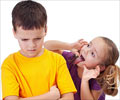Study done by the University of Cincinnati researchers shows certain antidepressants cause side effects for pediatric patients with OCD, anxiety.

TOP INSIGHT
Clinicians should consider medication-related adverse effects. SSRIs are a better option compared to SNRIs and are the treatment of choice for children and adolescents with anxiety.
Read More..
"For youth with anxiety disorders and OCD, these medications improve symptoms and functional outcomes," he says. "Over the past two decades, selective serotonin reuptake inhibitors, known as SSRIs, and serotonin-norepinephrine reuptake inhibitors, known as SNRIs, have become the standard medication treatments for pediatric patients with these conditions."
The UC study assessed quality-of-life issues.
"Evaluations of antidepressant tolerability focus almost entirely on discontinuation of the medicine or suicidality. We wanted to examine side effects commonly reported in pediatric patients treated with antidepressants, including agitation, nausea, abdominal pain, insomnia, headache and fatigue, in addition to suicidality and discontinuation of medication."
SSRIs increase levels of serotonin in the brain. SNRIs block the reabsorption of the neurotransmitters serotonin and norepinephrine in the brain.
They used statistical tools known as Bayesian hierarchical models created by Mills that enable results from different studies to be combined while taking into account variations across patients and those studies.
"SSRIs and SNRIs were not associated with suicidal thoughts. This finding is consistent with earlier studies that suggest that suicidality relates to the condition being treated," Strawn adds.
"Medication side effects are important for clinicians to consider, particularly in light of data suggesting these medications also differ in terms of how effective they are. SSRIs are a better option compared to SNRIs and are the treatment of choice for children and adolescents with anxiety."
Source-Eurekalert
 MEDINDIA
MEDINDIA

 Email
Email






